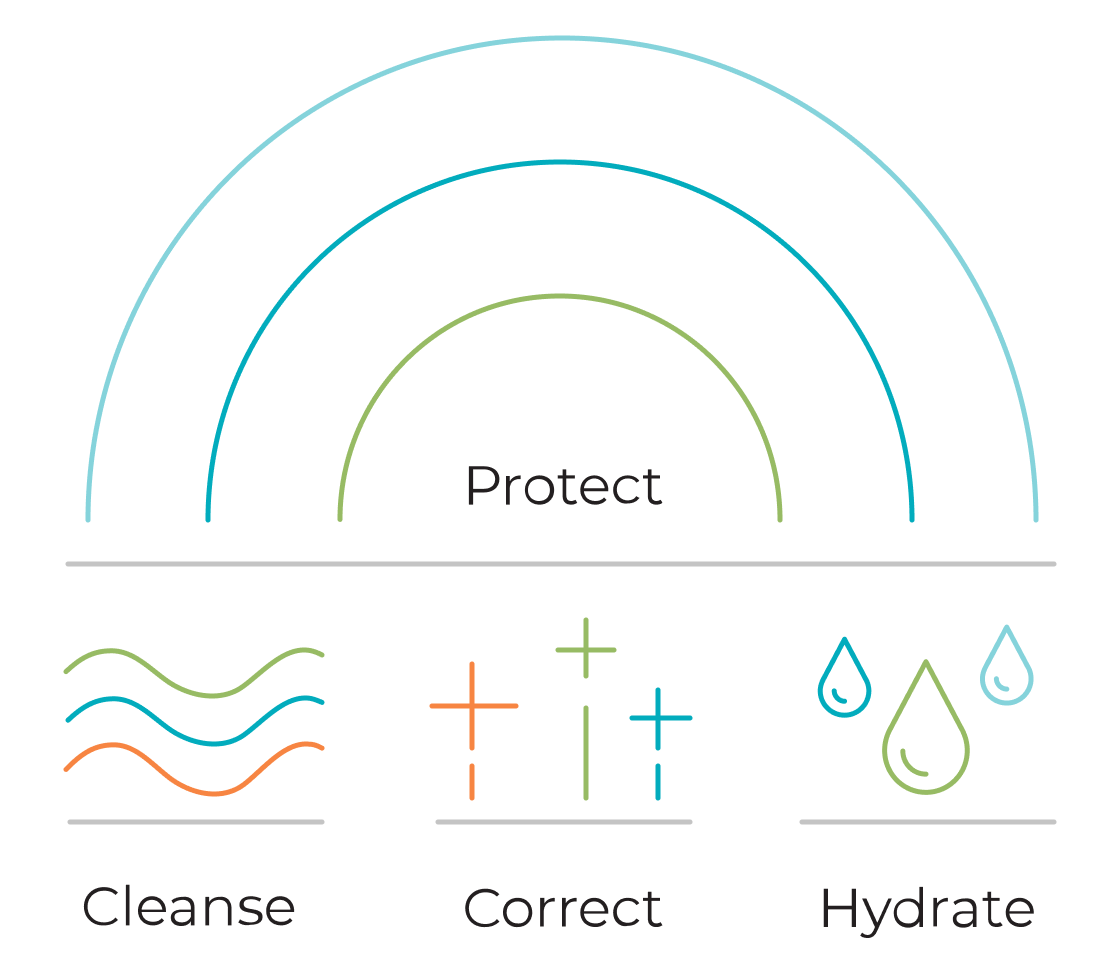Retinol, Retin A and Tretinoin for Rosacea: Best Anti-Aging Treatment

Do you have rosacea and have you been searching for an effective treatment and anti-aging skin care routine? You may have heard about retinol, retin a, and tretinoin for rosacea and how tricky they may be to use properly.
So how do you know if and which retinoids are best for your rosacea? And how do you incorporate a successful age-defying regimen?
After many inquiries here at Dr. Bailey Skin Care regarding rosacea treatment and anti-aging skin care options, I wanted to share my 35+ years of dermatologist experience and recommendations in this article.
Options for Rosacea Treatment & Anti-Aging Skin Care
In this article I provide guidance on the following approaches and products to treat rosacea and find an effective anti-aging skin care routine:
- Rosacea Skin Care Products
- Complete Rosacea Skin Care Routine
- Additional Options
- Bottom Line for Rosacea Treatment & Anti-Aging
- Explore Further
The Best Rosacea Skin Care Products
Your facial skin care routine can control your rosacea and put it into remission, as it did for this customer:
Relief and results at last! I have suffered from seborrheic dermatitis & rosacea for more than 20 years. After using these products for one week, my dry scales are gone & the redness from my rosacea is gone. No more itchy and stinging facial skin. Also, slowly but surely the bumps associated with my rosacea are disappearing. Tamara V
Once your rosacea is controlled, it is easier to add a product to address your anti-aging concerns.
So let’s take a look at some of the best rosacea skin care products I found most effective over the years.
Dr. Bailey’s Experience with Rosacea and Anti-Aging Skin Care Products
Anti-aging skin care is especially delicate for rosacea-type skin because any strong acids or rough exfoliation can trigger a flare-up.
Rosacea makes skin very sensitive, which if you suffer from rosacea, you've noticed! That said, I'm often able to help my rosacea patients find gentle yet effective age-defying skin care options and create a successful anti-aging skin care program, frequently including retinol or tretinoin, that also helps get their rosacea under control. It's not easy, but it is worth it because tretinoin/retin-a and retinol creams have such wonderful anti-aging properties.
For anyone testing out an anti-aging rosacea skin care regimen, I always emphasize:
“ Each patient’s skin is unique and I customize the approach based on what they can tolerate. Rosacea is easy to provoke and so there is no way to predict how a person will do. I, of course, can’t say if your skin would tolerate these anti-aging options and I recommend that you see a dermatologist for specific recommendations and treatments."
- Dermatologist Dr. Cynthia Bailey
Retinol, Retin A, Tretinoin, and Rosacea
Over the years I have found retinoids such as retinol and Tretinoin cream (aka Retin-A) the most tolerable anti-aging product for rosacea-type skin, more so than AHA/Glycolic Acid products or Vitamin C products (both are acid pH products).
Exfoliating with a retinoid may be a good choice for rosacea. This family of ingredients exfoliates skin without friction. Retinoids are also less likely to irritate rosacea than acid pH exfoliating products like AHAs (glycolic acid).
Retinol
- Retinol is vitamin A
- Retinol products are known to be less irritating to sensitive skin, such as those suffering from rosacea, and easier to tolerate than are tretinoin products (such as Retin A)
- Retinol products are available without a prescription
Tretinoin
- Tretinoin is a natural retinol derivative
- Retin A is a brand name for tretinoin
- Tretinoin anti-aging products require a prescription
Both achieve greater skin rejuvenation results at the highest available concentrations, and I love them both for anti-aging skin care.
Both retinol and tretinoin are proven to provide anti-aging benefits to skin by helping to counter the consequences of skin aging on a cellular level such as collagen loss, skin thinning and uneven skin pigmentation. [1]
In the next section, you will learn about the best anti-aging rosacea treatment plan and skin care products I created based on my observations treating my rosacea patients.

Complete Rosacea Skin Care Routine
Based on my extensive experience treating countless skin problems over the years, I developed my Complete Skin Care Routine to set my patients up for success. The routine involves using the right products for each of the 4 essential skin care steps: Cleanse, Correct, Hydrate, Protect.
Here is the guide for your anti-aging rosacea treatment and the steps to introduce retinoids into your routine:
Steps to Start Using Retin A or Retinol for Rosacea
I have good luck treating most of my rosacea patients with retinoids as their primary anti-aging skin care product. The trick is to calm the rosacea first.
1. Get Rosacea Under Control
For rosacea skin to tolerate retinoids such as retinol and tretinoin, supportive products are needed to soothe and calm the rosacea. I control the rosacea first for a few months using calming products as part of my patients’ daily skin care routine to help keep rosacea in remission.
I created my Rosacea Therapy Skin Care Kit.to help my patients. This kit provides the best anti-aging rosacea treatment by combining facial redness controlling products with a rosacea-healing moisturizer and sunscreen.
This kit includes all the products you need to follow the routine below.
Follow these steps daily to calm and control your rosacea:
- Cleanse by alternating a pH balanced Extremely Gentle Foaming Facial Cleanser during the day and Calming Zinc Bar Soap at night
- Correct and calm rosacea inflammation twice daily with Green Tea Antioxidant Skin Therapy after cleansing
- Hydrate skin to help heal rosacea-damaged and fragile skin barrier with Daily Hydrating Moisturizing Face Cream
- Protect skin from UV triggered rosacea flare ups with the mineral-based broad spectrum Sheer Strength Pure Physical Matte Tinted Facial Sunscreen, SPF 50
Some cases require medical treatment. See my guide to for details and for how to incorporate your prescription medication with your skincare routine: Rosacea Medical Treatments: Creams, Topical & Oral Medications, and Procedures
2. Start Tretinoin or Retinol
When the rosacea is in remission, I then slowly sneak in the tretinoin or retinol cream. We start it once or twice a week and slowly advance to nightly.
The Retinol Intensive Anti-Wrinkle Cream is much easier to add than Retin A because it is proven to be less irritating. It contains green tea to help calm skin while the retinol works.
Learn all about how to create a tretinoin skincare routine and how to layer it with other products.
3. If Rosacea Flares Up
If the rosacea starts to flare up, we stop the tretinoin/retinol, calm down the rosacea then resume.
This holistic skin care approach sets your skin up to fight rosacea - understand that one ‘wrong’ rosacea-provoking product in your skin care routine can trigger a rosacea flare.
Explore Further
Learn more about how retinol works, its benefits, and how to use it in my detailed article:
What is Retinol and how does it work for your skin?
For more information on how I coach my patients on the use of tretinoin cream you may want to read my post:
How to Correctly Use Retin A (tretinoin) for Acne and Anti-Aging Skin Care
"I just wanted to say that I love the Calming Zinc Soap! I've been using it for a week and it has truly changed my life. Thank you so much for a wonderful product, it has made a huge improvement in my skin!! :)" - Brandy M
Additional Options for Anti-Aging Rosacea Treatment
Exfoliation
I received this question about exfoliation and rosacea from a reader:
Dr. Bailey, I am in my mid-30's and starting to see some aging in my skin. Also, I have rosacea and my skin is very sensitive/reactive. Is it possible for me to use an exfoliator to remove facial dead skin, which is making my face look dull and dry? Also, would using an Exfoliating Sponge with my facial cleanser be too harsh? Thank you for your time, Ames
Gentle exfoliation with a scrub can work for some rosacea-type skin. However, it is not my top choice because rosacea skin is so easily triggered by even the gentlest pressure.
I encourage my patients to use the Exfoliating Facial Sponge with extremely gentle pressure in the morning so they can enjoy bright skin during the day.
You may only be able to use this method twice a week, but it provides an avenue to remove dead skin cells. Extremely sensitive skin probably can't tolerate any physical exfoliation, but if you can, this is a good option.
I prefer to brighten dull rosacea-prone skin with retinol or another retinoid.
Calming Facials by a Medical Aesthetician
Calming facials by a medical aesthetician have been helpful for my rosacea patients. The calming facials soothe rosacea-type skin, allowing the skin to tolerate gentle exfoliation with the Exfoliating Facial Sponge and retinol or tretinoin cream.
The interval between facials is every 6 weeks and it is important to find a medical aesthetician that is familiar with rosacea skin or understands a "calming facial."
Bottom Line for Rosacea Treatment and Anti-Aging Skin Care Options
There are several anti-aging skin care options for anyone with rosacea, but it requires significant caution and care. Always discontinue exfoliation or retinol/tretinoin during a rosacea flare-up, and slowly reintroduce them after calming the rosacea.
Take Control with the Right Products and Routine
- Follow the steps in this guide to take control of your rosacea and introduce retinol or tretinoin for the best anti-aging treatment.
- Use the Rosacea Therapy Skin Care Kit to help you build a highly effective, complete skin care routine to support rosacea healing. It includes the right cleanser for rosacea, and moisturizer and sunscreen to help protect rosacea-prone complexions from dryness and UV rays that are known to trigger rosacea.
- With rosacea under control, it is easier to add a retinoid, such as my Retinol Ultra-Intensive Anti-Wrinkle Night Cream.
Each patient's skin is unique and I customize the approach based on what they can tolerate. Rosacea is easy to provoke and so there is no way to predict how a person will do. Of course, I can't say if your skin would tolerate these anti-aging options and I recommend that you see a dermatologist for specific recommendations and treatments.
Explore Further
If you would like a more in-depth discussion on anti-aging rosacea skin care, check out the following guides:
- Understanding Rosacea - Symptoms, Types, Triggers & Treatment
- Skin Care & Treatment for Rosacea.
- What is Retinol and how does it work for your skin?
- How to Correctly Use Retin A (tretinoin) for Acne and Anti-Aging Skin Care
- How to Get Rid of Redness on the Face - Dermatologist Explains
- Using Glycolic Acid and Retinol or Tretinoin (Retin A) for Anti-Aging
- How to Apply Tretinoin Cream: A Guide to Demystifying Its Use
- Food & Lifestyle Choices That Trigger or Help Rosacea
Disclaimer: Please realize that availing yourself of the opportunity to submit and receive answers to your questions from Dr. Bailey does not confer a doctor/patient relationship with Dr. Bailey. The information provided by Dr. Bailey is general health information inspired by your question. It should not be a substitute for obtaining medical advice from your physician and is not intended to diagnose or treat any specific medical problem (and is not an extension of the care Dr. Bailey has provided in her office for existing patients of her practice). Never ignore your own doctor’s advice because of something you read here; this information is for general informational purposes only.
References


